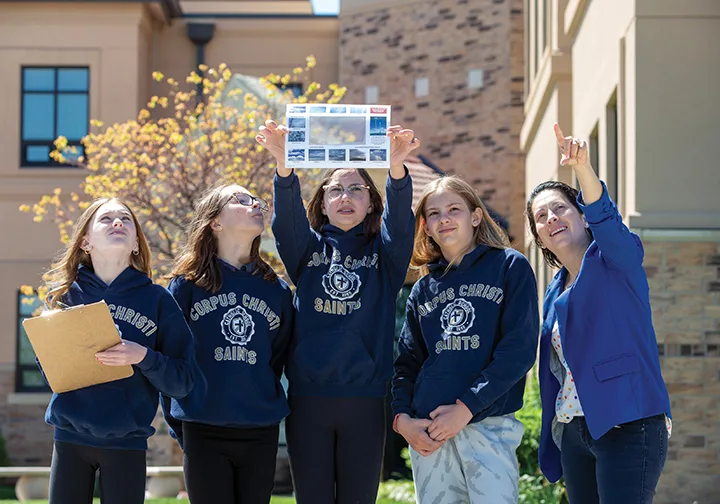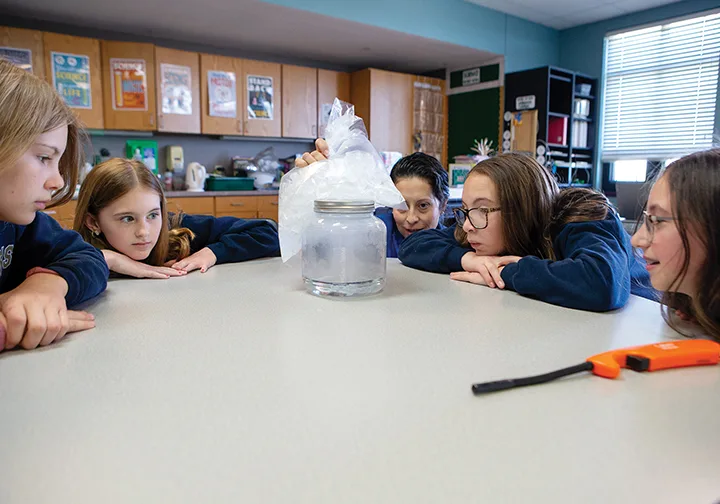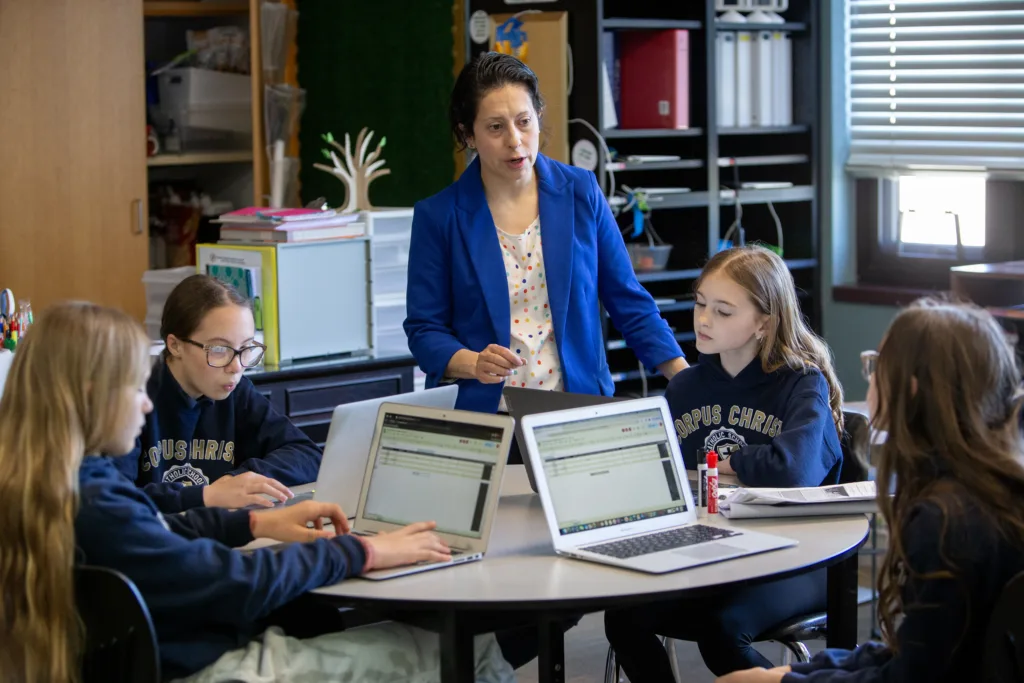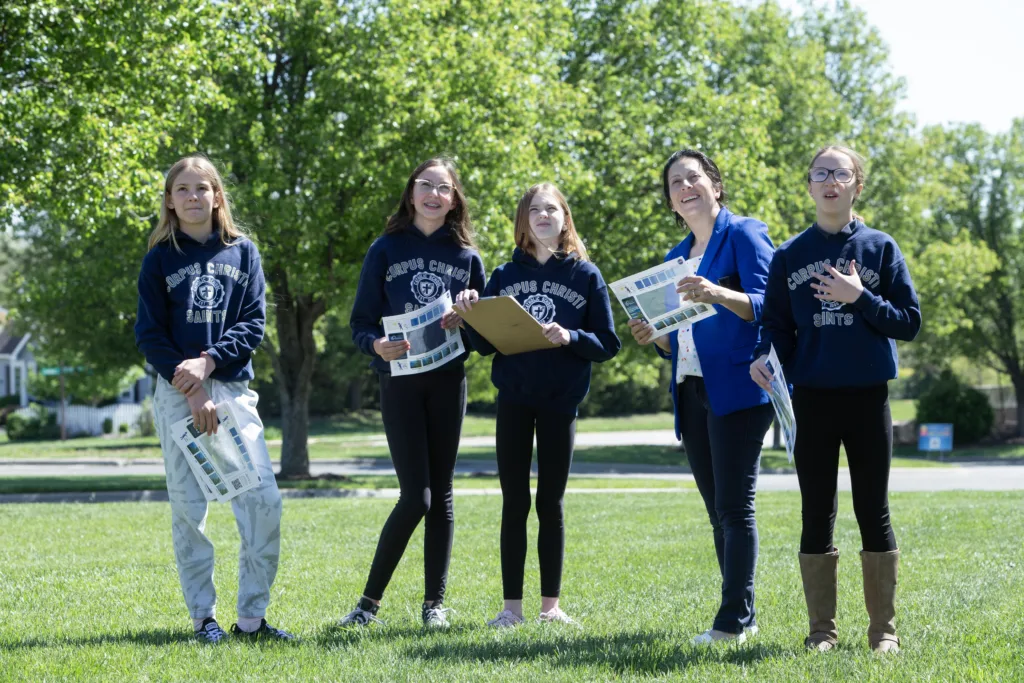
by Moira Cullings
moira.cullings@theleaven.org
LAWRENCE — Four students at Corpus Christi School here have spent the past three months researching how relative humidity affects cloud formation.
“When I presented [their research to a group of] NASA scientists, their jaws kind of dropped,” said teacher Humbelina Harper. “They were like, ‘What grade are your students in?’
“That’s when I think it became alive.”
Emery Bailey, Aurora Harper, Claire Miller and Brynna Whitmore are fifth graders at Corpus Christi.
They earned the chance to present their scientific findings to a group of NASA and national STEM scientists at the Southwest Student Symposium from May 3-4 in Fort Worth, Texas.
“They’ve been selected to do this,” said Harper, “and I think it’s a lifetime opportunity for them.”
Wonder and awe
Harper submitted her students’ research project to a funding committee offering scholarships to support their trip to the Southwest Student Symposium, and it was accepted.
“They will be doing a poster presentation to a group of NASA scientists who will judge them on different criteria,” said Harper.
“If they score high enough with the other schools,” she continued, “their project could be picked to go present [on an international scale in] New York later this summer.”

The students will also have the chance to participate in a night nature walk observation where they will help with data collection to further environmental knowledge.
Since becoming a teacher just two years ago after working professionally in medical lab science, Harper has sought out ways to further her own education and enhance her students’ learning opportunities.
She applied for a GLOBE educator cohort program through NASA this school year and was one of 20 teachers in the United States who were accepted.
This past year, the cohort focused on learning NASA’s cloud protocol.
“What that means is scientists are able to research the same information throughout the world through very detailed procedures called protocols,” explained Harper.
Learning how to take the readings with that protocol took up much of her professional development time, which was done on her own time.
The work allowed her to incorporate the cloud protocol curriculum into her classrooms and teach her students how to become “citizen scientists.”
“This is something that they can do outside of school in their homes,” said Harper.

The students were taught how to make a valid scientific observation by recording and writing scientific nature notes. They then learned the process of peer reviewing to validate each other’s information.
Miller proposed a research question about how relative humidity affects cloud formation, and her nature note stood out. She and her three peers ran with the research.
“They did readings, they learned about statistically significant variables, they collected their data, they’ve analyzed it, they’ve been making graphs, they created a cloud in the classroom,” said Harper.
It’s been a joy for the teacher to witness.
“I love seeing how far the kids can develop an idea within their scope of wonder,” she said.
It’s also been thrilling for Corpus Christi principal Kirsten Wondra.
“It’s a testament to their hard work, dedication and the support of their families and teachers,” said Wondra.
“Such opportunities for academic enrichment are invaluable in shaping their educational journeys and fostering a love for learning,” she added. “I especially love that it is a team of girls showing their skill and knowledge in a STEM field.”
Bright future
Harper is proof that life-changing discoveries can take place at any stage of life.
“Through COVID, I home schooled my four kids,” she said. “I fell in love with teaching, and I decided to pivot my career from the hospital lab to the classroom.
“I’ve just been enjoying showing them how much bigger this world can be.”
She also teaches eighth grade science and seventh grade religion and has helped the seventh graders prepare for the sacrament of confirmation.
“They’re exploring how science and God are just totally intertwined with our faith,” said Harper, “and how the unseen — even though we can’t see it — doesn’t mean it’s not there.”

Harper emphasized the importance of creating hands-on learning opportunities through which students can explore both in and out of the classroom.
“We have to keep building their wonder right now,” she said, “because this is when you can captivate the kids.”
That style of teaching has been “a blessing” for Corpus Christi, said Wondra, who believes Harper “embodies our school’s mission of creating lifelong learners in a faith-filled environment who are prepared academically, socially and spiritually.”
Harper and her students are looking forward to attending the Southwest Student Symposium, where the teacher believes it’s just the beginning for the young scientists.
“They’ll be able to add this to their resumes for college apps and everything,” she said.
“A lot of the NASA scientists that are currently there were GLOBE students at one point in time or another,” she added, “so I think that’s really cool.”






